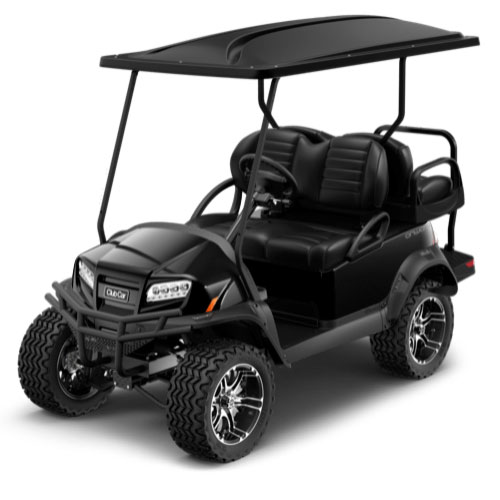Despite the many benefits of using lead acid batteries as any alternative to the gasoline powered Club Car golf carts, lead is not perfect and it comes with some major setbacks. These include extremely long charging times; lead batteries are also very heavy and they have a small energy carrying capacity. Therefore, in order to carter and mitigate these problems Club Car introduced the lithium-ion battery powered Club Car Onward golf cart. The Lithium-ion battery chemistry used in the Club Car Onward golf cart can carry a larger amount of energy thereby giving the golf cart considerably longer range on a single charge however lithium is not perfect and does come with a few problems of its own.
Table of Contents
Lithium-Ion Batteries Anatomy
Like lead acid batteries the batteries used in the Lithium Onward golf cart store chemical energy which is converted to electrical energy when the battery is in use. It has two electrodes; the anode and the cathode and electrons migrate from the lithium in the anode through the electronic components in the Club Car Onward golf cart such as the motor and head lights to the cathode. The flow of such electrons in the electronic components is also called the flow of electricity hence, it provides electrical power to the Club Car Onward golf cart components. The Club Car Onward lithium battery packs a 3.1Kwh energy storage capacity which offers more range, however the lithium-ion battery pack used in the Club Car Onward golf cart comes with a few problems and these will be discussed below.
1. Safety
The electrolyte in the lithium-ion battery pack use in the Club Car Onward golf cart can cause blindness or severe burns hence care is needed when handling the battery for purposes such as maintenance. Personal protective equipment such safety googles, safety gloves and work suits including safety shoes with metal toe caps are a must in order to mitigate the problems caused by the lithium-ion battery pack electrolyte. Lithium itself is very reactive, especially when in contact with water where it combusts producing flames that cannot be easily extinguished using traditional fire extinguishing methods such as the use of water hence causing severe problems such as property damage as such the club car onward HP lithium battery pack should always be isolated from the all sources of moisture.
2. Service
The lithium-ion battery pack used in the Club Car Onward golf cart has a problem of not being serviceable. If the battery pack is flooded and submerged, batteries can be damaged due to leaks and causing explosions. If submerged, replace the battery before charging or use. If the battery is opened, electrical shock, explosion or fires may occur hence the battery should not be opened to eliminate this problem. If the battery is damaged in any way that affects its operation it must be discarded.
3. Lithium-Ion Battery Charger
The battery charger, cord, plug or golf cart receptacle for the lithium-ion battery pack used in the Club car Onward golf cart are not easily reparable if damaged. This could cause fires and serious injury hence to resolve this problem a new battery charger and accessories must be purchased if the old ones are not in use any more.
The Club Car Onward charger cord has a problem of being susceptible to cracks, cuts and frayed wires hence these may need replacing by a trained professional in order to resolve the problem. The charger as well as the receptacles may need cleaning as such this should be done frequently.
4. Heating Problems
The Club car Onwards battery charger as well as the batteries have a problem of overheating hence ventilation is necessary when charging the batteries to provide cooling and reduce problems of burning out battery connections. Do not touch the battery charger when charging as the heat could cause problems of burns. The recommended temperature range to charge the batteries is -4 degrees Fahrenheit (-20 degrees Celsius) to 113 degrees Fahrenheit (45 degrees Celsius).
5. High Voltage
The lithium-ion battery pack used in the Club Car Onward golf cart produces very high voltage of 58V and this can give rise to the problem of electrocution if the battery is not handled properly. Insulating clothing and tools should be used with the Club Car Onward lithium-ion battery pack. Remove the interlock fuse before servicing the Club Car Onward golf cart to eliminate the problem of electric shock. Also ensure no metal has contact with the positive and negative terminals of the battery as the battery could short circuit and combust or explode.
6. Regenerative braking
This is feature allows the Club Car Onward golf cart to use the momentum of the moving golf cart to charge the battery but the problem is that its’ performance decreases when the battery is fully charged hence it is only used when the golf cart is moving.
7. Lithium-Ion Batteries Recycling
The lithium-ion batteries used in the Club Car Onward golf cart have a problem of not being easily recyclable. The lithium-ion battery should be collected and recycled separately from other waste, they should not be recycled at the municipal waste, only at designated lithium-ion batteries recycling facilities to eliminate the recycling problem.
8. Lithium and Cobalt Cost
The lithium and cobalt used in the Club Car Onward battery pack are very hard to find hence they are very expensive. That makes the battery very expensive. The battery is also hard to repair if damaged hence the solution to the problem is buying a new battery pack if the old one is now defective.
9. Lithium-Ion Battery Weight
One problem in particular with the lithium-ion battery used in the Club car Onward golf cart is weight. The battery alone weighs 115Ib (52kg) and this extra weight results in a decrease in the range that the battery can do. One solution to this problem is carrying slightly less heavy equipment on the golf cart to increase the range the golf cart can do.
10. Battery Storage
The Club Car Onward battery has several problems related to the storage of the battery. Incorrect storage of the battery can cause damage and permanent loss of battery capacity, it may also render the battery unusable. A fully discharged onward lithium battery put in storage can render it permanently unserviceable. To solve this problem the battery needs to be charged during extended storage. Also do not exceed the storage temperature limits. The Club Car Onwards battery should also be charged with all accessories turned off as charging with these on could lead to problems of fires and serious personal injury. When the Run/Tow-Stow switch is set to Tow/Stow. The battery will self-discharge to between 30 to 50 %, hence to solve this problem keep the Club Car Onward charger connected to the battery during extended storage to maximize the life of the battery.

